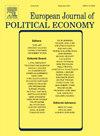Do as I say, not as I do? Economists policymakers and fiscal consolidation
IF 2.4
3区 经济学
Q2 ECONOMICS
引用次数: 0
Abstract
Do individual policy-makers matter for fiscal policy and, if so, under which conditions do they matter the most? Does a formal training in economics lead policymakers to implement a distinct set of fiscal policies? Do economists-turned-policymakers follow through with what they presumably teach in their classroom? This article aims to answer these questions with respect to fiscal consolidation (austerity) by analyzing a sample of Western and European countries between 1978 and 2019. By focusing on a subset of fiscal policies that are weakly orthogonal to the business cycle, I abstract from the most contentious debates in macroeconomics which revolve around the ‘best’ fiscal response to economic shocks (the infamous austerity vs stimulus debate). As such, I investigate the effects of economists on fiscal policy in a most-likely-case approach, i.e. when economic theory is by and large in agreement on what the best course of action is. Across a variety of specifications, modeling choices, estimators, and temporal and spatial sub-samples, I find no evidence that either the Head of the Executive or the Finance Minister's formal education in economics is (unconditionally) associated with fiscal consolidation policy. Nevertheless, the analysis reveals some political and institutional conditions under which economists-turned-Heads of Government are indeed more likely to implement fiscal consolidation. Governments led by economists are more likely to implement fiscal consolidation when the government is less fractionalized, when they are supported by a parliamentary majority, and when there are fewer institutional constraints on the executive.
照我说的做,别照我做的做?经济学家、政策制定者和财政整顿
个别政策制定者对财政政策重要吗?如果重要,在什么情况下他们最重要?正规的经济学培训能引导政策制定者实施一套独特的财政政策吗?经济学家出身的政策制定者是否会按照他们在课堂上可能教授的内容进行到底?本文旨在通过分析1978年至2019年间西欧和欧洲国家的样本,回答这些关于财政整顿(紧缩)的问题。通过关注与商业周期弱正交的财政政策子集,我从宏观经济学中最具争议的辩论中抽象出来,这些辩论围绕着对经济冲击的“最佳”财政反应(臭名昭著的紧缩与刺激辩论)。因此,我用最可能的方法来研究经济学家对财政政策的影响,即当经济理论大体上就最佳行动方案达成一致时。在各种规格、建模选择、估计器以及时空子样本中,我发现没有证据表明行政首长或财政部长的经济学正规教育与财政巩固政策(无条件地)相关。然而,分析揭示了一些政治和制度条件,在这些条件下,经济学家出身的政府首脑确实更有可能实施财政整顿。经济学家领导的政府更有可能在政府分权程度较低、得到议会多数支持、行政机构约束较少的情况下实施财政整顿。
本文章由计算机程序翻译,如有差异,请以英文原文为准。
求助全文
约1分钟内获得全文
求助全文
来源期刊

European Journal of Political Economy
Multiple-
CiteScore
3.40
自引率
10.00%
发文量
106
期刊介绍:
The aim of the European Journal of Political Economy is to disseminate original theoretical and empirical research on economic phenomena within a scope that encompasses collective decision making, political behavior, and the role of institutions. Contributions are invited from the international community of researchers. Manuscripts must be published in English. Starting 2008, the European Journal of Political Economy is indexed in the Social Sciences Citation Index published by Thomson Scientific (formerly ISI).
 求助内容:
求助内容: 应助结果提醒方式:
应助结果提醒方式:


